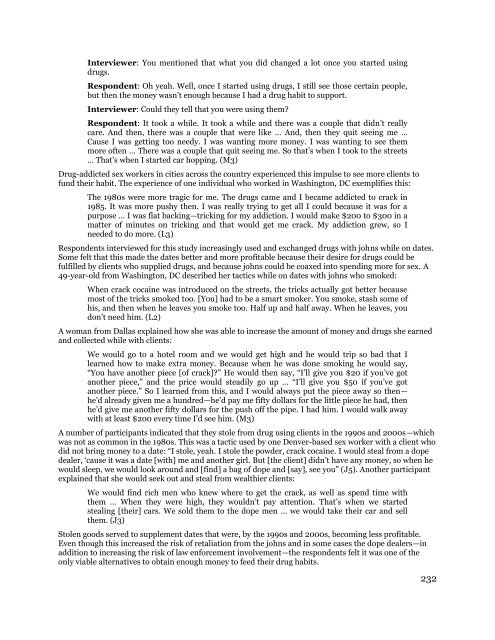413047-Underground-Commercial-Sex-Economy
413047-Underground-Commercial-Sex-Economy
413047-Underground-Commercial-Sex-Economy
You also want an ePaper? Increase the reach of your titles
YUMPU automatically turns print PDFs into web optimized ePapers that Google loves.
Interviewer: You mentioned that what you did changed a lot once you started using<br />
drugs.<br />
Respondent: Oh yeah. Well, once I started using drugs, I still see those certain people,<br />
but then the money wasn’t enough because I had a drug habit to support.<br />
Interviewer: Could they tell that you were using them<br />
Respondent: It took a while. It took a while and there was a couple that didn’t really<br />
care. And then, there was a couple that were like … And, then they quit seeing me …<br />
Cause I was getting too needy. I was wanting more money. I was wanting to see them<br />
more often … There was a couple that quit seeing me. So that’s when I took to the streets<br />
… That’s when I started car hopping. (M3)<br />
Drug-addicted sex workers in cities across the country experienced this impulse to see more clients to<br />
fund their habit. The experience of one individual who worked in Washington, DC exemplifies this:<br />
The 1980s were more tragic for me. The drugs came and I became addicted to crack in<br />
1985. It was more pushy then. I was really trying to get all I could because it was for a<br />
purpose … I was flat backing—tricking for my addiction. I would make $200 to $300 in a<br />
matter of minutes on tricking and that would get me crack. My addiction grew, so I<br />
needed to do more. (L3)<br />
Respondents interviewed for this study increasingly used and exchanged drugs with johns while on dates.<br />
Some felt that this made the dates better and more profitable because their desire for drugs could be<br />
fulfilled by clients who supplied drugs, and because johns could be coaxed into spending more for sex. A<br />
49-year-old from Washington, DC described her tactics while on dates with johns who smoked:<br />
When crack cocaine was introduced on the streets, the tricks actually got better because<br />
most of the tricks smoked too. [You] had to be a smart smoker. You smoke, stash some of<br />
his, and then when he leaves you smoke too. Half up and half away. When he leaves, you<br />
don’t need him. (L2)<br />
A woman from Dallas explained how she was able to increase the amount of money and drugs she earned<br />
and collected while with clients:<br />
We would go to a hotel room and we would get high and he would trip so bad that I<br />
learned how to make extra money. Because when he was done smoking he would say,<br />
“You have another piece [of crack]” He would then say, “I’ll give you $20 if you’ve got<br />
another piece,” and the price would steadily go up … “I’ll give you $50 if you’ve got<br />
another piece.” So I learned from this, and I would always put the piece away so then—<br />
he’d already given me a hundred—he’d pay me fifty dollars for the little piece he had, then<br />
he’d give me another fifty dollars for the push off the pipe. I had him. I would walk away<br />
with at least $200 every time I’d see him. (M3)<br />
A number of participants indicated that they stole from drug using clients in the 1990s and 2000s—which<br />
was not as common in the 1980s. This was a tactic used by one Denver-based sex worker with a client who<br />
did not bring money to a date: “I stole, yeah. I stole the powder, crack cocaine. I would steal from a dope<br />
dealer, ‘cause it was a date [with] me and another girl. But [the client] didn’t have any money, so when he<br />
would sleep, we would look around and [find] a bag of dope and [say], see you” (J5). Another participant<br />
explained that she would seek out and steal from wealthier clients:<br />
We would find rich men who knew where to get the crack, as well as spend time with<br />
them … When they were high, they wouldn’t pay attention. That’s when we started<br />
stealing [their] cars. We sold them to the dope men … we would take their car and sell<br />
them. (J3)<br />
Stolen goods served to supplement dates that were, by the 1990s and 2000s, becoming less profitable.<br />
Even though this increased the risk of retaliation from the johns and in some cases the dope dealers—in<br />
addition to increasing the risk of law enforcement involvement—the respondents felt it was one of the<br />
only viable alternatives to obtain enough money to feed their drug habits.<br />
232


